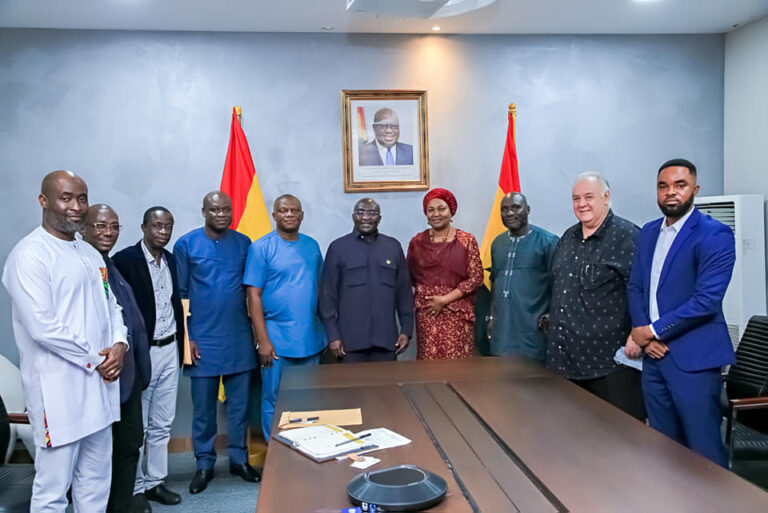In the wake of the challenging economic environment that characterised 2022 in Ghana, there is a pressing need to explore viable solutions that will propel the nation towards economic stability and growth. The past year witnessed a culmination of fiscal overruns and mounting debt distress, causing Ghana to lose access to both international and domestic financial markets. Rating agencies downgraded the country due to severe macroeconomic imbalances, resulting in a sharp depreciation of the Ghanaian cedi and high inflation rates. This crises had a significant impact on businesses operating in the country.
Ahigh-level delegation of the Ghana National Chamber of Commerce and Industry paid a courtesy call on the Vice President of the Republic of Ghana, His Excellency Alhaji Dr. Mahamudu Bawumia, to discuss the issues and the way forward.
The delegation includes Mr. Clement Osei Amoako (President, GNCCI), Mrs. Victoria M. E. Hajar (1st Vice-President, GNCCI) Mr. Stephane Miezan (2nd Vice-President, GNCCI) Mr. Mark Badu-Aboagye (CEO, GNCCI), Dr. Kojo Aboagye- Debrah (Chairman, Banks and Non-Financial Institutions, GNCCI, Trade Sector), Mr. Peter Atsu Dotse (Communications Officer, GNCCI) some Council Members of the Chamber.
GNCCI’s Views and Recommendations
- The Central Bank’s Demand Approach (Monitory Policy Tightening)
One of the central issues highlighted was the Bank of Ghana’s approach to tackling the economic challenges. The Chamber expressed concern about the Bank’s demand-driven strategy, which was not yielding the desired results due to the complex supply-side sources of the problem. Factors such as fluctuating fuel prices, food and energy costs, and imported inflation were identified as key contributors beyond the policy control of the Bank of Ghana.
- The Micro-Approach
The GNCCI’s evidence-based advocacy, coupled with active engagements with the business community and policymakers, revealed that addressing these critical issues required a micro-approach. This micro-approach according the Chamber is a necessary enabler for the successful implementation of macroeconomic policies set by the government.
3. Undermining Factors: Regulatory Environment, Capital Costs, Taxes and Cost of Electricity
The Chamber also highlighted various challenges that undermined the competitiveness of businesses in Ghana. These included:
- Regulatory Environments: Stringent regulations and bureaucratic hurdles hampered business growth and innovation
- High Cost of Capital: Access to affordable capital remained a challenge for many businesses, hindering expansion and investment.
- Taxes: The tax burden on businesses was a concern, impacting profitability and sustainability.
Cost of Electricity: High electricity costs were a barrier to competitiveness, particularly for energy-intensive industries.
Government Response
In response to the GNCCI’s concerns, Vice-President Dr. Mahamudu Bawumia reiterated the government’s unwavering dedication to improving the economy for the benefit of the business community and the nation at large.
- Government’s Commitment to Economic Improvement
He emphasised the government’s strategy for a holistic and sustainable approach to address the ongoing challenges.
- The Role of Agriculture in Ensuring Food Security
Dr. Bawumia stressed the importance of the agriculture sector in ensuring food security on the continent. He highlighted upcoming cabinet meetings where the government aimed to develop alternative measures to resolve current challenges, particularly related to food production and inflation.
3. Government Initiatives for Economic Enhancement
- The Vice-President outlined several measures being put in place by the government:
- Digital Platforms: The recent launch of digital platforms aimed to improve the business environment by promoting digital transactions and financial inclusion.
- Cashless Economy: Efforts were underway to transform Ghana into a cashless economy, ensuring that digital banking services were accessible to all citizens.
- Addressing Investment Attractiveness: Dr. Bawumia highlighted the government’s approach to making Ghana more attractive to investors, recognising the importance of empowering businesses to withstand market shocks.
While acknowledging past stability, both parties are committed to finding sustainable solutions to the current issues, ensuring the country’s economic resilience and growth.






